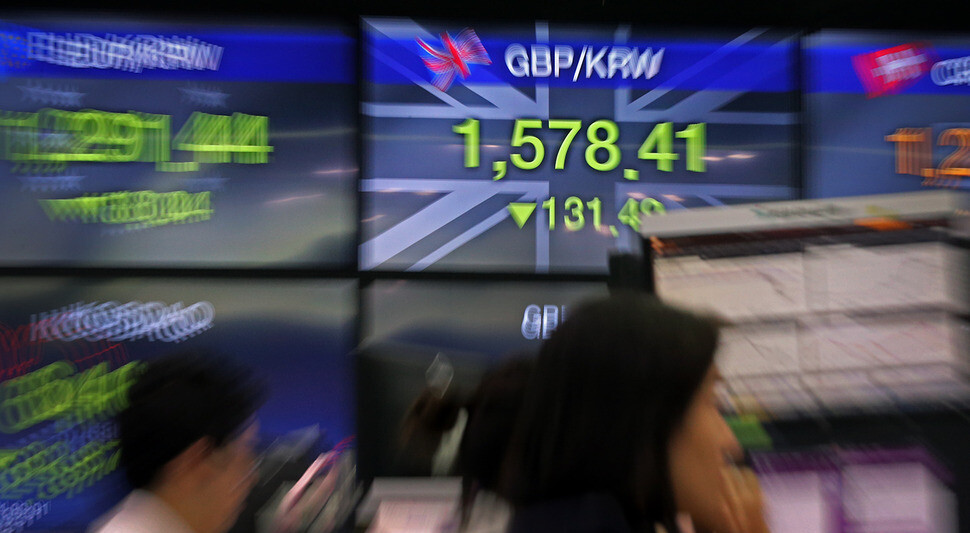hankyoreh
Links to other country sites 다른 나라 사이트 링크
[Editorial] In Brexit’s wake, South Korea needs a real plan for the economy

Already struggling with stagnation and restructuring, the South Korean economy now faces even greater uncertainty with the shock of the United Kingdom’s departure from the European Union. The financial market was in a state of panic following news of the “Brexit” on June 24. The KOSPI index fell by 3.1%, barely finishing above 1,900 points, while a side car (a restraining measure) went into effect on the KOSDAQ after it plunged by more than 7% during trading. The exchange rate against the dollar also jumped by nearly 30 won.
The biggest fear in terms of financial market shocks is the risk of capital outflows. UK investors accounted for 8.4% of foreign-owned stocks as of late May, representing the second-largest group after the US (39.8%). The Brexit also raises the specter of investors from other countries fleeing emerging markets amid a growing preference for safe assets.
The UK’s small percentage of South Korean trade is likely to mean the impact on the real economy will be lesser than for the financial market. Exports to the UK last year totaled US$7.4 billion, or just 1.4% of all exports. But a reduction in trade with China, which depends heavily on European exports, could have a substantial impact on South Korean exports as well. And if the Brexit leads to an trend of protectionism, the impact for the South Korean economy - which currently lives or dies by its exports - could be devastating.
Given all these developments, the South Korean government should respond to the Brexit shock by developing step-by-step scenarios for a worst-case situation. What we saw from it on June 24, however, did not inspire much trust. The Ministry of Strategy and Finance held talks with the Saenuri Party that morning ahead of its scheduled June 28 announcement of an economic policy course for the second half of 2016. There, it presented an economic growth rate forecast of 2.8% for the year. That was quickly retracted in the afternoon as the likelihood of the Brexit’s approval grew. In an explanatory statement, the ministry said its growth rate prediction was “still undecided due to growing uncertainty,” but it appeared visibly flustered by what had happened. Now is the time for Seoul to look carefully at the Brexit’s potential impact and offer a truly effective course for its economic policy.
Please direct questions or comments to [english@hani.co.kr]

Editorial・opinion
![[Column] Park Geun-hye déjà vu in Yoon Suk-yeol [Column] Park Geun-hye déjà vu in Yoon Suk-yeol](https://flexible.img.hani.co.kr/flexible/normal/500/300/imgdb/original/2024/0424/651713945113788.jpg) [Column] Park Geun-hye déjà vu in Yoon Suk-yeol
[Column] Park Geun-hye déjà vu in Yoon Suk-yeol![[Editorial] New weight of N. Korea’s nuclear threats makes dialogue all the more urgent [Editorial] New weight of N. Korea’s nuclear threats makes dialogue all the more urgent](https://flexible.img.hani.co.kr/flexible/normal/500/300/imgdb/original/2024/0424/7317139454662664.jpg) [Editorial] New weight of N. Korea’s nuclear threats makes dialogue all the more urgent
[Editorial] New weight of N. Korea’s nuclear threats makes dialogue all the more urgent- [Guest essay] The real reason Korea’s new right wants to dub Rhee a founding father
- [Column] ‘Choson’: Is it time we start referring to N. Korea in its own terms?
- [Editorial] Japan’s rewriting of history with Korea has gone too far
- [Column] The president’s questionable capacity for dialogue
- [Column] Are chaebol firms just pizza pies for families to divvy up as they please?
- [Column] Has Korea, too, crossed the Rubicon on China?
- [Correspondent’s column] In Japan’s alliance with US, echoes of its past alliances with UK
- [Editorial] Does Yoon think the Korean public is wrong?
Most viewed articles
- 1‘We must say no’: Seoul defense chief on Korean, USFK involvement in hypothetical Taiwan crisis
- 2N. Korean delegation’s trip to Iran shows how Pyongyang is leveraging ties with Moscow
- 3‘Weddingflation’ breaks the bank for Korean couples-to-be
- 4[Reportage] On US campuses, student risk arrest as they call for divestment from Israel
- 5Amnesty notes ‘erosion’ of freedom of expression in Korea in annual human rights report
- 6[Column] Park Geun-hye déjà vu in Yoon Suk-yeol
- 7Korea sees more deaths than births for 52nd consecutive month in February
- 8[Editorial] New weight of N. Korea’s nuclear threats makes dialogue all the more urgent
- 9Will NewJeans end up collateral damage in internal feud at K-pop juggernaut Hybe?
- 10[Guest essay] The real reason Korea’s new right wants to dub Rhee a founding father